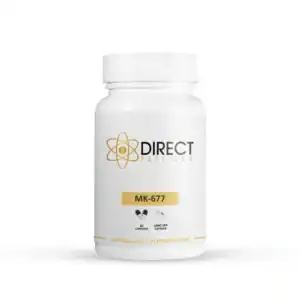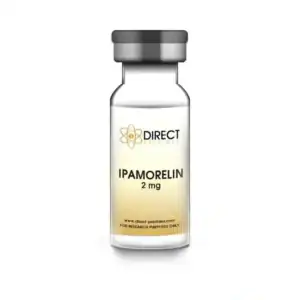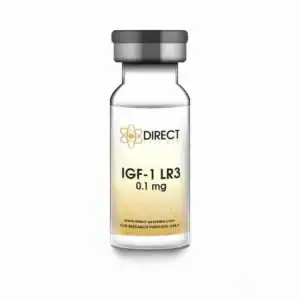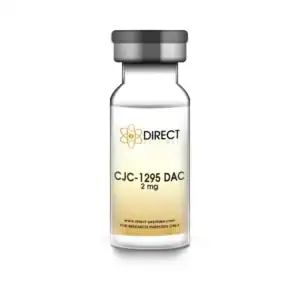Step into the fascinating world of growth hormone peptides. It is a complex and intriguing area. For newcomers, terms like GHRH peptides, GHRP peptides, Sermorelin, Hexarelin, GH peptides, and Insulin-like growth factor 1 peptides may seem unfamiliar. This guide aims to explain these concepts clearly and make them easy to understand.
Growth hormone peptides are short chains of amino acids that stimulate the production of growth hormones in the body. They work by binding to specific receptors on cells, triggering a cascade of reactions that lead to increased growth, repair, and regeneration processes in tissues and organs.
Let’s break it down. Growth hormone peptides are compounds that help produce and release human growth hormone (HGH). They work by promoting growth hormone secretion. These peptides include many types, each with unique properties and functions.
Notable classes are GHRH peptides like CJC-1295 DAC and ghrelin receptor agonist GHRP peptides, such as GHRP-2, GHRP-6, and ipamorelin. The field also includes GH peptides like HGH fragment 176-191 and Insulin-like growth factor 1 peptides, such as IGF-1 LR3 and Mechano Growth Factor (MGF).
These peptides help regulate growth, metabolism, blood pressure, and tissue repair. They also support other vital functions. In simple terms, they act like neurotransmitters and play a big role in physical health. Understanding them is an important step toward creating new peptide therapies.

Let’s explore the fascinating world of growth hormone peptides. These compounds are divided into different types. Each type has unique functions and characteristics. Here is a closer look at some of the main classes:
GHRH peptides, or Growth Hormone-Releasing Hormone peptides, send signals to the pituitary gland to produce and release HGH. A key example is CJC-1295 DAC, a modified GHRH that increases the hormone’s half-life. This allows for longer stimulation of HGH release.
Explore CJC-1295 DAC peptides from Direct Peptides Norway.
Growth Hormone-Releasing Peptides (GHRPs) work like GHRH peptides but can also block somatostatin, a hormone that stops HGH release. Examples include GHRP-2, which triggers HGH secretion and helps regulate appetite. Learn more about GHRP-2 Peptide from Direct Peptides.
Another example is GHRP-6, known for stimulating HGH production and supporting appetite regulation. Explore GHRP-6 Peptide available at Direct Peptides.
Lastly, Ipamorelin stands out because it selectively causes HGH release without affecting other hormones. Discover Ipamorelin Peptides from Direct Peptides.
MK-677, or Ibutamoren, is a non-peptide growth hormone secretagogue that acts like ghrelin, a hormone that increases hunger and growth hormone levels. Unlike injectable GHRPs, MK-677 can be taken orally, offering a convenient option. It boosts HGH and IGF-1 secretion, supporting muscle growth, recovery, and body composition. Research also suggests it may improve sleep, bone health, and cognitive function.
Buy MK677 Capsules online from Direct Peptides Norway
GH peptides like HGH Fragment 176-191 are designed to mimic the fat-burning part of HGH. They are commonly studied for their potential in weight loss and muscle definition.
Buy HGH Fragment 176-191 from Direct Peptides Norway
IGF-1 peptides, such as IGF-1 LR3 and MGF, are connected to muscle growth and repair. IGF-1 LR3 has an extended half-life, enhancing its effects. MGF is linked to muscle growth after resistance exercise.
Understanding these growth hormone peptide classes provides insights into the science behind growth, metabolism, and tissue repair.
Check out Direct Peptides Norway high quality IGF-1 LR3 peptide here.
 As we explore the role of growth hormone peptides, it becomes clear that these molecules offer significant potential in health, wellness, physical performance, and therapeutic research. Let’s take a closer look at their key benefits.
As we explore the role of growth hormone peptides, it becomes clear that these molecules offer significant potential in health, wellness, physical performance, and therapeutic research. Let’s take a closer look at their key benefits.
Growth hormone peptides are important for overall health, wellness, and the immune system. They are involved in many processes, such as growth, development, and metabolism regulation.
Research shows they may help with fat loss by promoting the production and release of hormones, increasing lipolysis (fat breakdown), and reducing lipogenesis (fat formation). Some peptides, like ipamorelin, are even known to improve sleep cycles, which supports mental wellbeing.
Growth hormone peptides also play a key role in improving physical performance. They help with muscle growth and repair, boosting athletic ability and stamina. For example, studies suggest that Insulin-like Growth Factor 1 peptides, such as IGF-1 LR3 and MGF, promote muscle growth after resistance exercise. These peptides can also speed up recovery, making them widely researched in the field of sports science.
The benefits of growth hormone peptides extend to therapeutic research. Scientists are studying their potential to treat growth hormone deficiencies, muscle wasting from chronic diseases, and age-related declines. Their role in tissue repair shows promise for wound healing and surgical recovery. As research continues, more applications may be discovered, highlighting a bright future for growth hormone peptides in medical science.
While growth hormone peptides have many benefits, it is important to consider potential side effects. These peptides are usually well-tolerated, but some side effects can occur. Examples include fluid retention, joint pain, and increased appetite. A rare but more serious side effect is hypoglycemia, or low blood sugar.
Reducing side effects is important. Here are some strategies:
While growth hormone peptides show potential, they should be studied responsibly and under proper medical supervision.
In conclusion, growth hormone peptides, such as GHRH peptides, GHRP peptides, GH peptides, and Insulin-like Growth Factor 1 peptides, play key roles in many physiological processes. They help regulate metabolism, inflammation, testosterone production, and sleep cycles. These peptides also support athletic performance and may have medical applications, such as tissue repair and treatment for growth hormone deficiencies. However, it is important to be aware of possible side effects, like fluid retention, joint pain, increased appetite, and hypoglycemia, and to use strategies to reduce these risks.
To summarise, growth hormone peptides are divided into different classes. Each class has unique features and functions. They play important roles in growth, metabolism, and muscle repair. They also show promise for treating certain health conditions and improving physical performance. But it is essential to consider potential side effects and manage them carefully.
This overview provides a glimpse into the world of growth hormone peptides. As research continues, we will learn more about their benefits, applications, and risks. Continued study in this field is important. A deeper understanding can help us responsibly use the potential benefits these peptides offer, contributing to overall health and wellness.
The products mentioned in this post are intended for research and medical purposes only. To be used by trained professionals.
References
[1] Machida S, Booth FW. Insulin-like growth factor 1 and muscle growth: implication for satellite cell proliferation. Proc Nutr Soc. 2004 May;63(2):337-40.
[2] Liu H, Bravata DM, Olkin I, Friedlander A, Liu V, Roberts B, Bendavid E, Saynina O, Salpeter SR, Garber AM, Hoffman AR. Systematic review: the effects of growth hormone on athletic performance. Ann Intern Med. 2008 May 20;148(10):747-58.
[3] Schally AV, Zhang X, Cai R, Hare JM, Granata R, Bartoli M. Actions and Potential Therapeutic Applications of Growth Hormone-Releasing Hormone Agonists. Endocrinology. 2019 Jul 1;160(7):1600-1612.
[4] Møller N, Jørgensen JO. Effects of growth hormone on glucose, lipid, and protein metabolism in human subjects. Endocr Rev. 2009 Apr;30(2):152-77.
[5] Miller BS, Velazquez E, Yuen KCJ. Long-Acting Growth Hormone Preparations – Current Status and Future Considerations. J Clin Endocrinol Metab. 2020 Jun 1;105(6):e2121–33.
Growth hormone peptides may support sleep quality by increasing natural growth hormone release during deep sleep phases. Growth hormone secretion follows a circadian rhythm and peaks at night. By supporting this process, certain peptides may help reinforce normal sleep architecture and recovery cycles, though direct effects on sleep remain an active area of research.
Growth hormone peptides may indirectly influence bone density by increasing growth hormone and IGF-1 activity. These hormones support bone remodeling by stimulating osteoblast function and mineralization. Research shows clearer benefits in growth hormone-deficient models, while effects in healthy subjects appear more gradual and depend on duration and hormonal response.
Growth hormone peptides can affect insulin and blood sugar by increasing growth hormone levels, which may reduce insulin sensitivity and raise glucose output. At the same time, IGF-1 has insulin-like effects that may counterbalance this response. The overall impact depends on dosage, exposure time, and metabolic status.
The half life of growth hormone peptides varies by structure. Short acting GHRP peptides typically act for minutes to hours. Ipamorelin shows activity lasting up to a few hours. CJC-1295 with DAC has a prolonged half-life of several days due to its albumin binding properties, allowing sustained hormonal stimulation.
Most growth hormone peptides discussed in research settings are not FDA-approved. Compounds such as CJC-1295, ipamorelin, and GHRP peptides are classified as research substances. A small number of related peptides have FDA-approval for specific medical conditions, but this approval does not extend to all growth hormone peptides.

MK-677 Capsules
£41.87 Select options This product has multiple variants. The options may be chosen on the product page
BULK BUY
Ipamorelin Peptide Vial
£12.38 – £77.15Price range: £12.38 through £77.15 Select options This product has multiple variants. The options may be chosen on the product page
BULK BUY
BULK BUY
TWIN PACKS
IGF-1 LR3 Peptide Vial
£19.89 – £142.94Price range: £19.89 through £142.94 Select options This product has multiple variants. The options may be chosen on the product page
New Reduced Price
New Reduced Price
New Reduced Price
New Reduced Price
New Reduced Price
New Reduced Price
TWIN PACKS
CJC-1295 DAC
£24.20 – £159.26Price range: £24.20 through £159.26 Select options This product has multiple variants. The options may be chosen on the product pageALL CONTENT AND PRODUCT INFORMATION AVAILABLE ON THIS WEBSITE IS FOR EDUCATIONAL PURPOSES ONLY.
DISCLAIMER: These products are intended solely as a research chemical only. This classification allows for their use only for research development and laboratory studies. The information available on our Norway Direct Peptides website: https://direct-peptides.com is provided for educational purposes only. These products are not for human or animal use or consumption in any manner. Handling of these products should be limited to suitably qualified professionals. They are not to be classified as a drug, food, cosmetic, or medicinal product and must not be mislabelled or used as such.